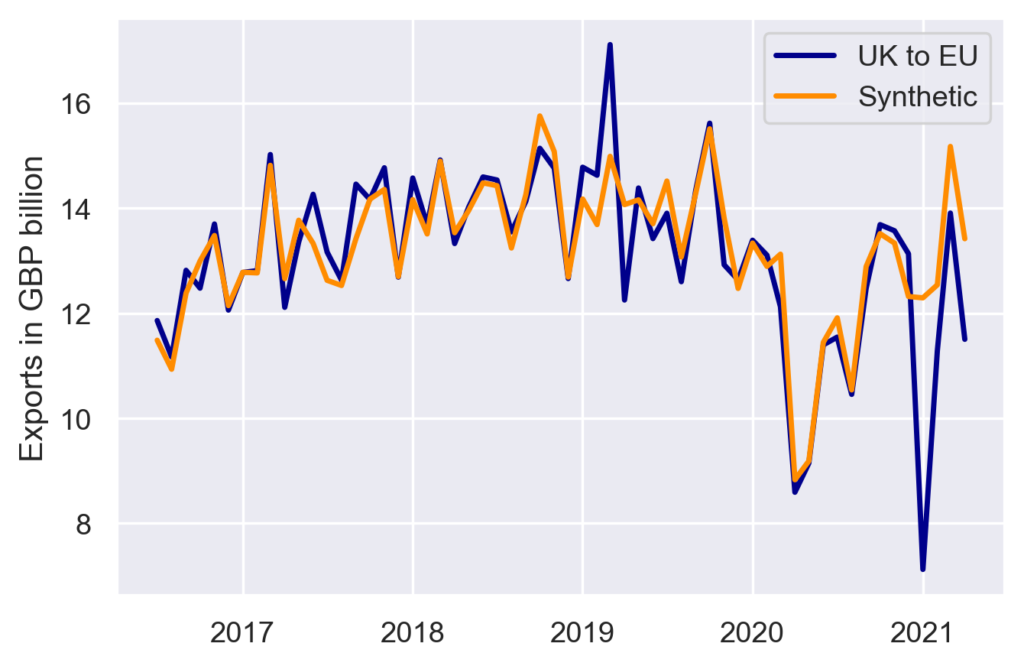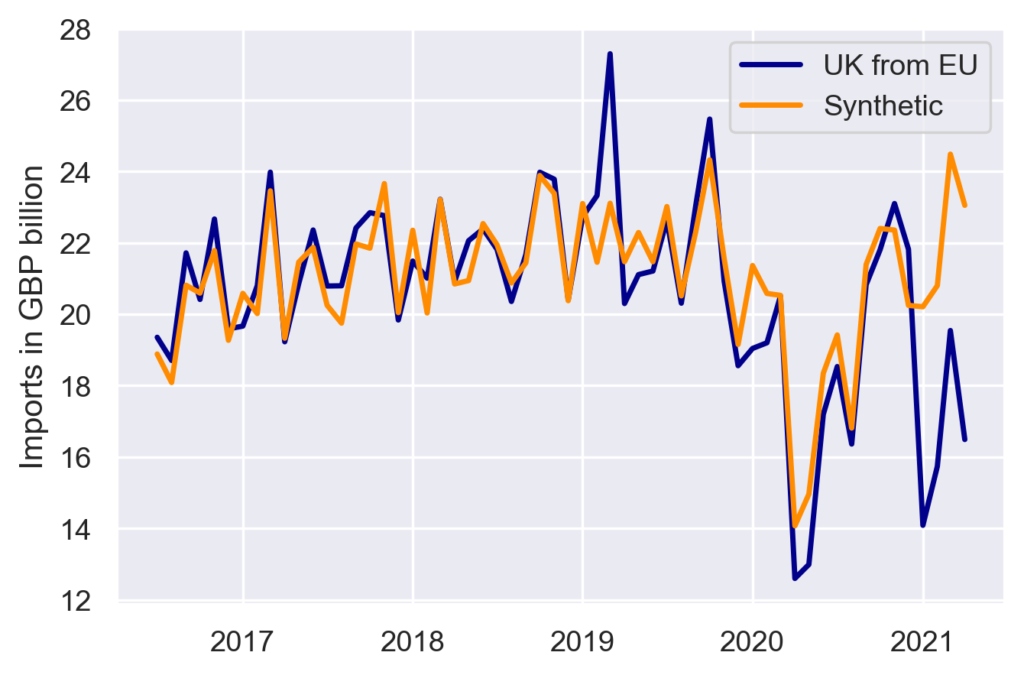23 July 2021
Nicolo Tamberi is Research Officer in Economics at the University of Sussex and a fellow of the UKTPO.
We have updated our estimates of the effects of the introduction of the Trade and Cooperation Agreement (TCA) on UK-EU trade in 2021 through to April. The methodology used was described in the UKTPO briefing paper 57 (see the appendix for details). We find that over the period January-April 2021, the TCA reduced UK exports to the EU by 18.7% and imports from the EU by 25.8% compared to the scenario in which the UK did not leave the EU.
For the analysis, we used HMRC for UK trade and Eurostat data for EU trade excluding gold from both exports and imports (HS code 7108). Over the last few months, analysts and commentators have noted a big gap between UK exports to the EU as reported by the UK and the corresponding flows reported by the EU (that is, UK exports to the EU reported by the UK and EU imports from the UK reported by Eurostat). We have investigated the issue in detail in our latest working paper and concluded that we agreed with the ONS that UK reported data should be used instead of the EU reported mirror flows. While both the UK and the EU changed the data collection method for UK-EU trade in 2021, the changes undertaken by the EU in its reported imports are larger than those of UK reported exports.
As always, these data are provisional and could be revised in the future, so our results should not be interpreted as definitive. Our preferred estimation, which uses the synthetic control method, shows that UK exports to the EU have been dramatically affected in January 2021 (-42%) and we find some milder evidence that they were negatively affected also in April 2021 (-14.3%). Adding up the period January-April 2021, UK exports to the EU were down by 18.7%. On the other hand, UK imports from the EU saw a smaller drop in January 2021, but they remained consistently below expectations for all months of 2021 to date. Over the entire period January-April 2021, UK imports have been 25.8% less than what they would have been otherwise. This can be seen in the figures below where the blue line depicts what actually happened, the orange lines give our counterfactual synthetic control estimates for what would have happened in the absence of Brexit.

A) UK exports to the EU

B) UK imports from the EU
The figures show actual UK exports to and imports from the EU excluding gold (HS 7108) and the synthetic series. We estimated the model for UK trade with each EU country and then aggregated the figure to EU total.
It is clear that over the period there has been a decline in exports and imports. The decline in imports appears to have been more consistent than the impact on exports and at this stage that is still somewhat puzzling. These are also still ‘early’ impacts as they only for the first four months.
Disclaimer:
The opinions expressed in this blog are those of the author alone and do not necessarily represent the opinions of the University of Sussex or UK Trade Policy Observatory.
Republishing guidelines:
The UK Trade Policy Observatory believes in the free flow of information and encourages readers to cite our materials, providing due acknowledgement. For online use, this should be a link to the original resource on our website. We do not publish under a Creative Commons license. This means you CANNOT republish our articles online or in print for free.
Surely, the issues here are that:
(a) the EU, for whatever reason, provide their figures for UK-EU imports/exports on a different basis to that provided by the likes of the ONS and, as such, a comparison is meaningless;
(b) UK exports to the EU continue to fall year-on-year, which was happening LONG before Brexit even became a term of phrase;
(c) If imports from the EU are down, then we must be getting our imports from other countries or there would be a marked difference in the availability of goods for sale in British shops, notwithstanding the effects of the Northern Ireland Protocol, or at least the EUs interpretation of the same and their refusal to acknowledge that this is having a direct effect on the availability of goods in the Province;
And, for more importantly,
(d) Aggregating UK imports/exports to separate EU countries as an EU total is not only misrepresentative but highly misleading because (i) it fails to take into account the fact that the UK does not export/import goods and services to each of the EU27 on an equitable basis, and (ii) it is based on the unquantifiable position of not knowing, without the gift of foresight, whether UK-EU imports/exports would have remained the same, continued to grow or continued to fall had we voted to remain in the bloc.
Or have I missed something?
I think you are right there, it is really based on the quantifiable position of not knowing, without the gift of foresight, whether UK and EU imports/exports would have remained the same, continued to grow or continued to fall had we voted to remain in the bloc.